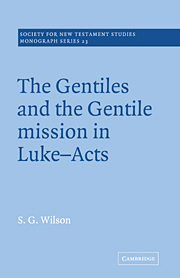Book contents
- Frontmatter
- Contents
- Abbreviations
- Preface
- 1 Jesus and the Gentiles
- 2 The Gentiles in Luke's Gospel
- 3 Lukan eschatology
- 4 The early chapters of Acts
- 5 Stephen and the Hellenists
- 6 Paul's conversion
- 7 Cornelius and the Apostolic Council
- 8 Paul's speech on the Areopagus
- 9 Jewish and Gentile missions
- 10 Summary and conclusions
- Bibliography
- Index of passages
- Index of authors
- Index of subjects
8 - Paul's speech on the Areopagus
Published online by Cambridge University Press: 04 March 2010
- Frontmatter
- Contents
- Abbreviations
- Preface
- 1 Jesus and the Gentiles
- 2 The Gentiles in Luke's Gospel
- 3 Lukan eschatology
- 4 The early chapters of Acts
- 5 Stephen and the Hellenists
- 6 Paul's conversion
- 7 Cornelius and the Apostolic Council
- 8 Paul's speech on the Areopagus
- 9 Jewish and Gentile missions
- 10 Summary and conclusions
- Bibliography
- Index of passages
- Index of authors
- Index of subjects
Summary
In this chapter we shall concentrate on the famous speech to the Gentiles at Athens (Acts 17: 22f). The speech at Lystra (Acts 14: 15–17), like the Areopagus speech, is addressed to ‘pure’ Gentiles, that is, those who have had no previous contact with Judaism. The speech at Lystra is considerably shorter than the Areopagus speech. Also, it raises fewer exegetical problems and its language is more clearly dependent on the LXX. Consequently, it will be dealt with mainly insofar as it throws light on Acts 17: 22f. As well as a detailed discussion of Acts 17: 22f, we shall try to discover clues both to Luke's understanding of the religious status of Gentiles over against Jews and Christians, and to his views on the methods to be used by Christian missionaries to the Gentiles.
THE CONTEXT OF THE SPEECH
It appears that for Luke Athens was the symbol of Greek culture. He is not concerned simply with the mission at Athens, but also with the way in which this signifies the overall approach of the Church to the pagan world. Similarly, though he singles out the Stoics and Epicureans for special mention, this does not mean that the speech's appeal is limited to them; rather they represent the two main views held in Greece at that time. Luke is not concentrating solely on the propagation of the gospel to the intellectual aristocracy of the pagan world; rather, he is addressing himself to the popular philosophies, the Volksglaube of the average Greek. The philosophers, like Athens itself, are used as symbols of a wider reality.
- Type
- Chapter
- Information
- The Gentiles and the Gentile Mission in Luke-Acts , pp. 196 - 218Publisher: Cambridge University PressPrint publication year: 1973



